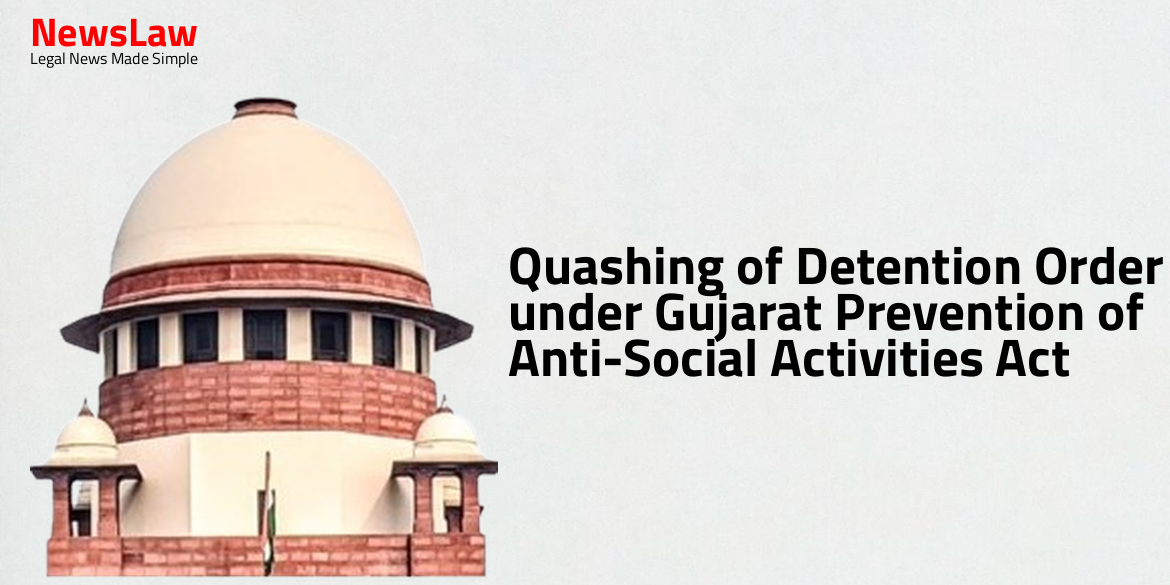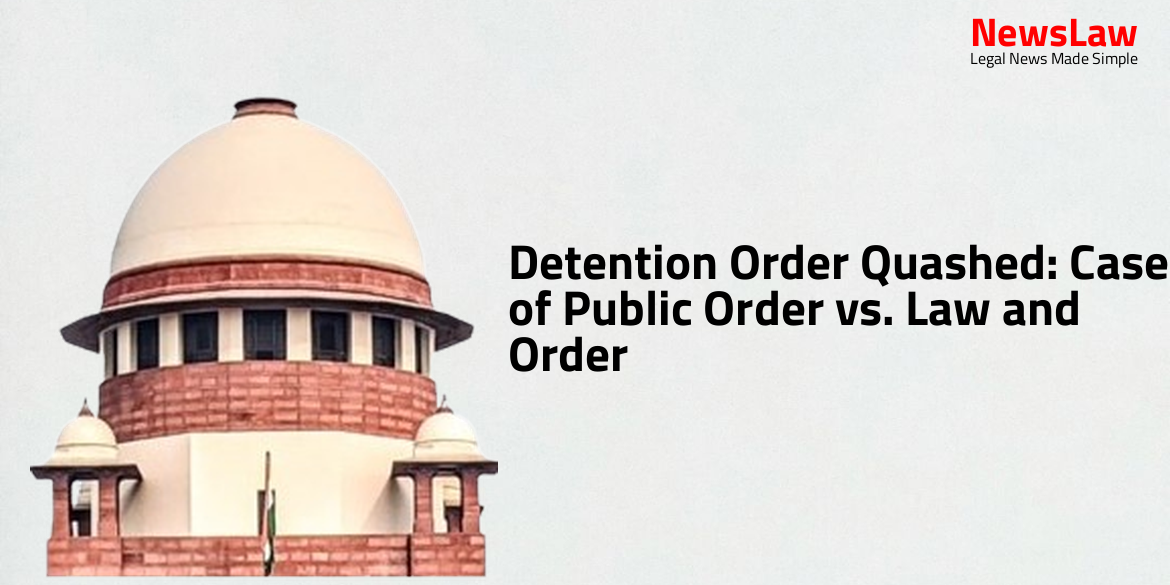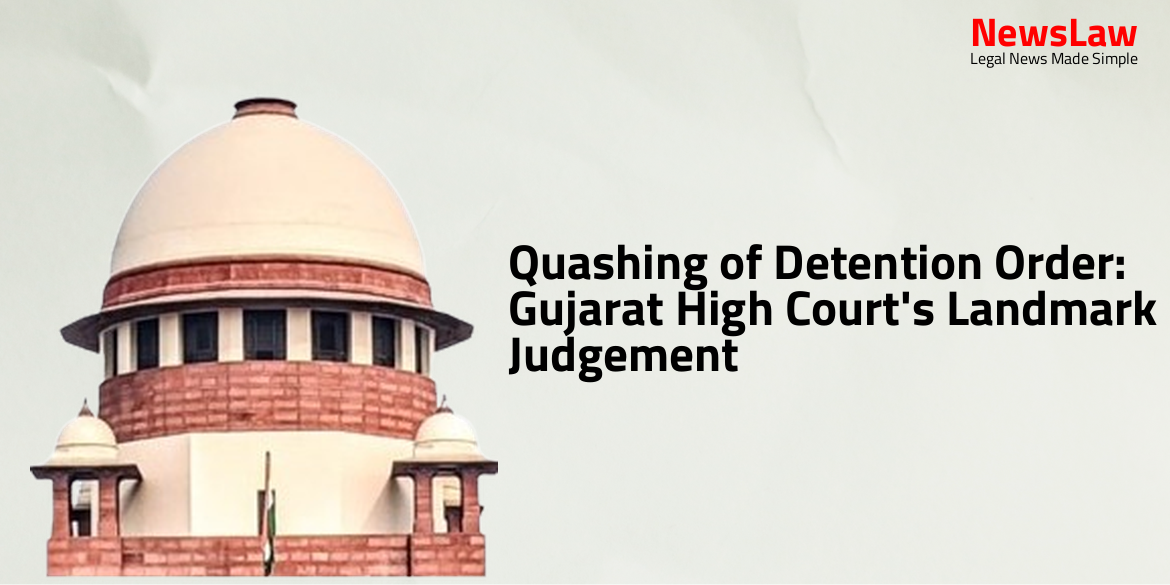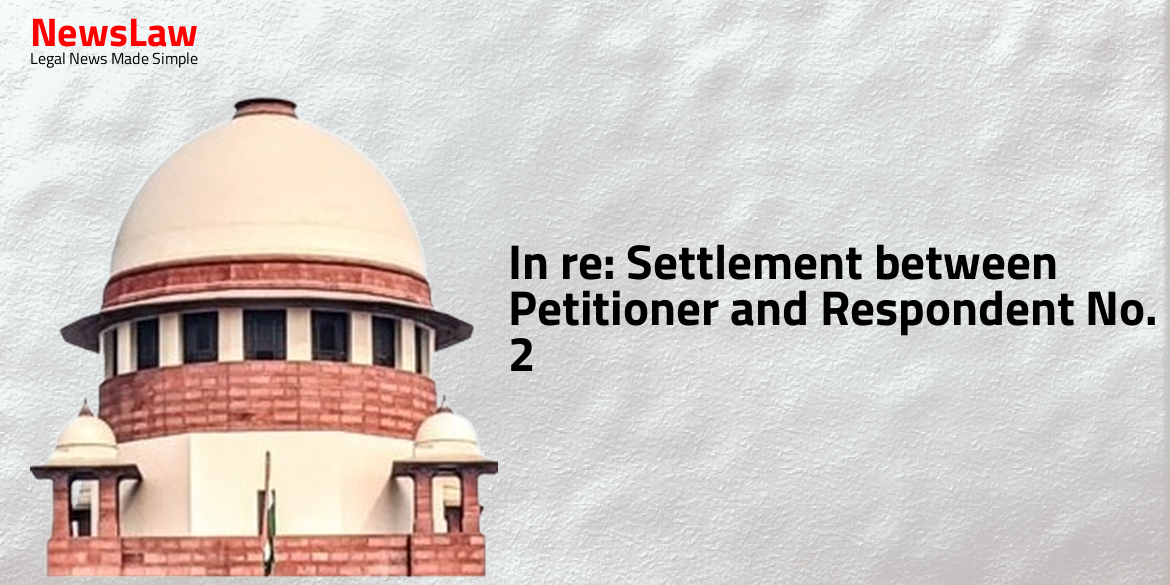In a significant ruling, the Gujarat High Court has quashed the detention order under the Gujarat Prevention of Anti-Social Activities Act, emphasizing the importance of upholding personal liberty and due process. This judgment sets a precedent in safeguarding individual rights in preventive detention cases.
Facts
- The present petition challenges the order of detention dated 23.12.2023 passed by the detaining authority under the Gujarat Prevention of Anti-Social Activities Act, 1985.
- The detaining authority has detained the petitioner under Section 3(1) of the Act.
- The petitioner is defined as a detenue under Section 2(c) of the Act.
Arguments
- The activities of the petitioner – detenue with respect to the criminal cases were argued not to have affected or disturbed the social fabric of society
- The registration of criminal cases alone was deemed insufficient to consider the petitioner – detenue as a threat to public order
- The alleged illegal activities were seen as unrelated to the maintenance of public order, more likely a breach of law and order
- Lack of substantial evidence beyond witness statements and FIR registrations to prove the petitioner – detenue’s activities as a breach of public order
- The fact that the petitioner – detenue is out on bail for all offenses was not considered by the detaining authority
- The detaining authority arrived at a subjective satisfaction that is not legal or valid according to the law.
- The FIR allegations do not pertain to public order as required by the Act.
- Other relevant penal laws are sufficient to address the situation.
- The detenue’s allegations do not align with the meaning of Section 2(c) of the Act.
- The learned AGP supported the detention order, stating that sufficient evidence indicates the detenue’s activities fall under Section 2(c) of the Act.
- The detaining authority’s decision is upheld by the AGP.
Analysis
- Detention orders under the Telangana Act of 1986 have been set aside by the High Court of Telangana, indicating a misuse of preventive detention power.
- No concrete evidence showing the detenue posing a danger to public order was presented besides general statements.
- A District Magistrate can act to prevent subversion of public order but not for maintenance of law and order under ordinary circumstances.
- When issuing detention orders, authorities must consider the provisions of Articles 21 and 22 of the Constitution of India.
- The Apex Court has clarified the legal position in various cases.
- Detention under Section 2(c) of the Act requires the individual to pose a significant threat to society, violating the overall peace and order.
- The lack of application of mind by the detaining authority to relevant circumstances is apparent in this case.
- The two FIRs against the detenu could be handled using regular criminal law procedures.
- The order does not mention any application for bail cancellation by the State authorities.
- The concept of law and order, public order, and security of the State has historical roots and is subject to constitutional safeguards.
- The Apex Court emphasized the importance of exercising caution when scrutinizing the validity of a preventive detention order, especially when the individual is already on bail for the same charge.
- The Court highlighted that personal liberty should not be sacrificed for preventive detention, as the State already has powers under criminal laws to curb such activities.
- Detention orders need to be evaluated against lawful standards to ensure they are necessary for the interest and security of the State and its citizens.
- The Court reiterated that preventive detention should not be a substitute for the ordinary law and investigating authorities should continue their functions in investigating crimes.
- There is a distinction between ‘law and order’ disturbances and those affecting ‘public order’, with preventive detention being for a limited time and not meant for perpetual custody without trial.
- The Constitution Bench clarified the difference between ‘law and order’ and ‘public order’ disturbances to prevent the misuse of preventive detention powers by the state.
- Over the years, the Court has quashed several detention orders for incorrectly applying the standard for maintenance of public order and relying on outdated information.
- The insertion of Article 22 in the Constitution aimed to prevent the arbitrary exercise of state authority through preventive detention measures.
- The Court raised concerns about the routine and unjustified use of preventive detention laws, emphasizing the need to distinguish between minor breaches of peace and serious disruptions to public order.
- Article 22 must be read as an exception to Article 21 and can only apply in rare and exceptional cases.
- Personal liberty under Article 21 is highly valued and the detaining authority must prove that the detention follows due process of law.
- The registration of FIRs alone does not relate to the breach of public order and cannot be the basis for invoking powers under the Act.
- No other relevant and cogent material was found for invoking the power under Section 3(1) of the Act.
Decision
- Direct service is permitted.
- Rule made absolute to the extent mentioned.
- The present petition is allowed.
- Impugned order of detention dated 23.12.2023 is quashed and set aside.
- Petitioner – detenue is ordered to be set at liberty forthwith.
Case Title: MUKESHBHAI @ BALLU BALRAM MADRASI @ NAYKAR Vs. THE STATE OF GUJARAT
Case Number: R/SCA/3093/2024



